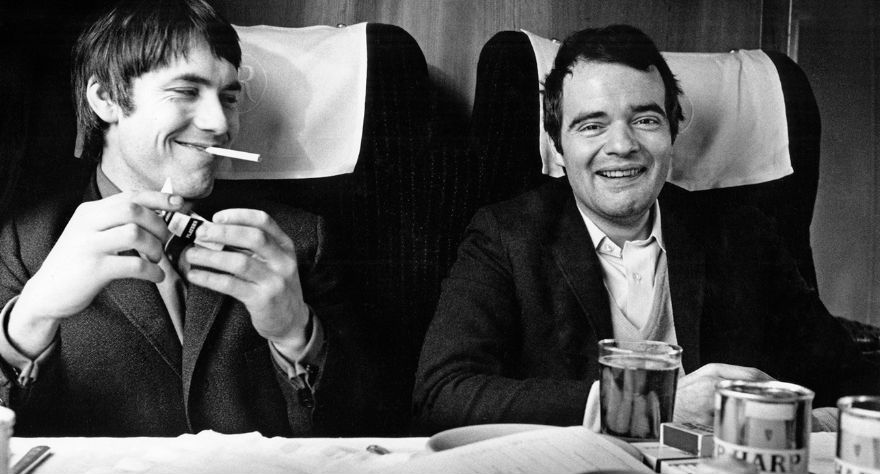
An emotionally rich, unorthodox rock doc about the two men who inadvertently gifted us one of the best bands in the world.

An emotionally rich, unorthodox rock doc about the two men who inadvertently gifted us one of the best bands in the world.
Back in 1960s London, Kit Lambert and Chris Stamp were two ambitious young fellows who had a common fascination with The French New Wave. Jean-luc Godard was one of their heroes and, inspired by films like Breathless and Vivre Sa Vie, the friends endeavored to make a nice piece of cinema verité of their own. They thought they’d make an arty documentary chronicling the rise of a young rock band, and they found one as they shuffled into a trendy London pub called the Railway Tavern. There, onstage, was a band of unattractive blokes who called themselves The High Numbers. Sadly, the movie was never made, and Kit and Chris ended up becoming the band’s managers. But something more extraordinary blossomed out of the arrangement that no one could have ever expected: The High Numbers went on to take over the world of rock ‘n’ roll and become one of the biggest bands in history. We know them better now as The Who.
While there’s plenty of exclusive footage and archival goodness for fans of The Who to indulge in, Lambert & Stamp isn’t a traditional rock doc at all, but a story about a friendship of a lifetime that developed between the titular once-aspiring filmmakers. Both of them have left us now, but first-time director James D. Cooper was fortunate enough to have access to Stamp in his final years (Lambert died in 1981 of mental illness and drug abuse), interviewing him about what it was like working with Roger Daltrey and Pete Townshend, and more importantly with Kit. Aside from the original interviews and conversations Cooper and his team filmed (over ten years, amazingly), the film uses a thrilling whirlwind of archival footage of Lambert, Stamp, and the band to transport you back to the ’60s and ’70s and make you wish you were there, partying and rocking into the wee hours of morning.
Cooper, a veteran cinematographer, and editor Chris Tellefson utilize a frenetic, almost tactile aesthetic that lends the film texture and a sense of immediacy and authenticity that most rock docs (the ones that play out like VH1 retrospectives) fail to capture. The modern scenes (like a stirring conversation between Daltrey and Townshend about the darker, more troubled side of drummer Keith Moon) are filmed in Super 16, which bolsters the film’s grittiness. Tellefson’s editing breathes new life into the old footage, his subtle manipulations changing the tone of the clips entirely (I’d dare say similar to the way Kanye West reinvigorates vintage samples).
As documentary subjects, Lambert and Stamp are pretty captivating. Their contrasting personalities, backgrounds and styles make them a unique duo to say the least. Stamp, the brother of actor Terence Stamp, was a rough-around-the-edges partier from a postwar, working-class background, while Lambert, whose BBC-like posh accent and affinity for high fashion is constantly emphasized, was a picture of class. Stamp is interviewed extensively, but what’s amazing is that Lambert’s presence in the film is the more prominent of the two, an incredible feat by Cooper. Their story is one of love, heartache, and tragedy, and that Cooper tells it so well with one of the subjects being deceased is staggering.
Adding a layer of sentimentality are Daltrey and Townshend, who recall being immediately enamored with the pair. “They changed my life forever,” says Townshend, who often consulted them for songwriting advice, as seen in a terrific clip of him running through chords and melodies with Lambert and Stamp in a rehearsal space. Daltrey also discusses his insecurities about being a frontman, his candor a testament to the trust Cooper built with his subjects. Also interviewed is Richard “Barney” Barnes, a friend from the early days who further fills out the tapestry of memories.
You’d be hard-pressed to find a more vivid portrait of the teenage revolution of the ’60s than Lambert & Stamp, but that only begins to scratch the surface of all it has to offer. The generosity of Daltrey and Townshend show to their old friends is heartwarming, and despite the film’s abrasive, raucous aesthetic, there’s a tenderness to it that creeps up on you unexpectedly. Cooper’s created a stirring, emotionally rich documentary that starts his legacy as a director off on the best foot possible.